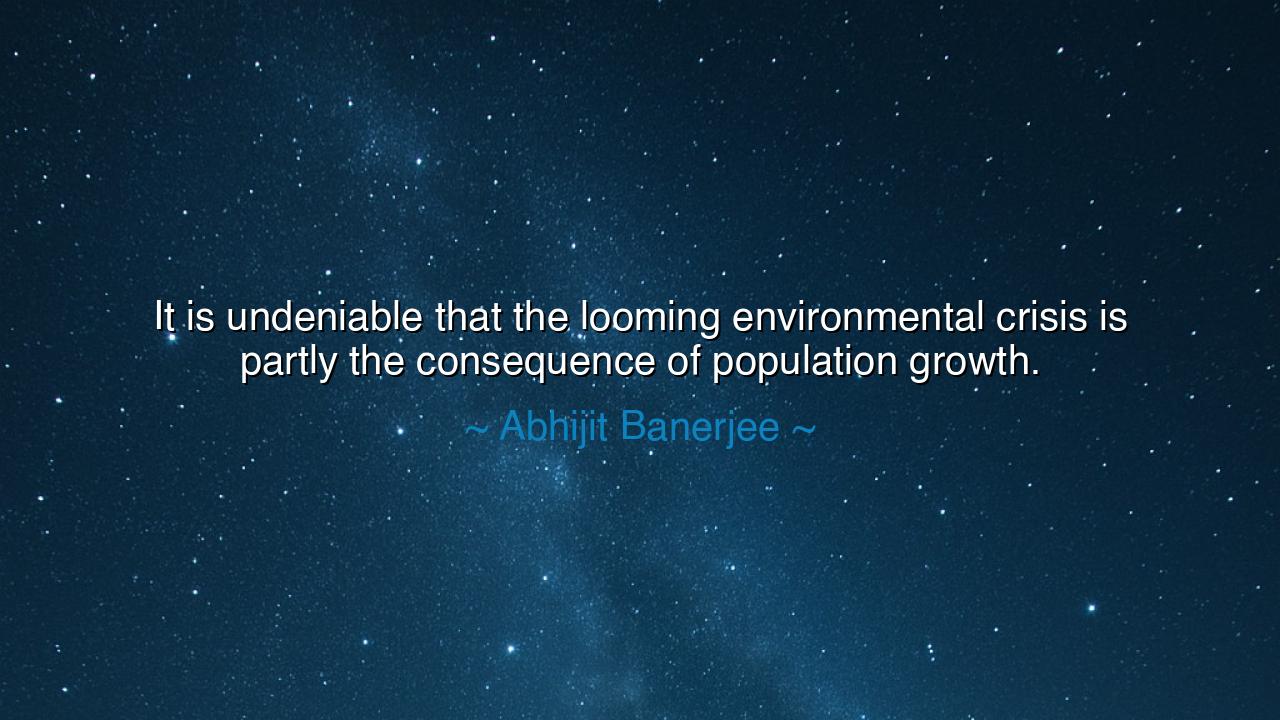
It is undeniable that the looming environmental crisis is partly
It is undeniable that the looming environmental crisis is partly the consequence of population growth.






Hear, O children of the earth and seekers of wisdom, the sober words of Abhijit Banerjee: “It is undeniable that the looming environmental crisis is partly the consequence of population growth.” In this saying lies a truth many fear to speak aloud: that humanity’s sheer numbers, though a sign of vitality and endurance, also strain the earth beyond her limits. The soil must feed more mouths, the rivers must quench more thirsts, the forests must give way to more fields, and the air must absorb more smoke. Growth, unchecked and untempered, becomes both a triumph and a burden.
The ancients long understood the peril of imbalance. They taught that harmony was the key to survival—that if one took more than the land could give, famine or flood would surely follow. Yet in our age, the environmental crisis has grown vast, for billions now inhabit the earth where once only millions dwelt. Each person needs food, shelter, and energy; and though each life is sacred, the collective weight has become heavy upon forests, oceans, and skies. Thus Banerjee speaks not in condemnation of life itself, but in warning: the crisis we face is not merely the fault of greed or industry, but also of population growth pressing hard upon finite resources.
Consider the story of Easter Island, where a thriving people cut down every tree to support their growing population and monuments. At first, their numbers seemed a sign of strength; but when the last tree fell, there was no wood for boats, no way to fish, no way to build. Famine spread, conflict erupted, and their civilization collapsed. This small island is but a mirror of the world today: a reminder that when people multiply beyond what the land can sustain, decline follows, not by malice alone but by necessity.
Yet Banerjee’s words also call for wisdom beyond fear. For population alone does not seal our fate—it is how humanity uses its numbers that determines the outcome. Some nations with great populations live lightly on the earth, while others, with fewer people, consume vast quantities of resources. Thus the crisis is shaped both by how many we are and by how we live. Population growth is one strand of the problem, but it weaves together with consumption, inequality, and exploitation to form the web of destruction.
The meaning of his teaching is this: we must reckon honestly with the weight of numbers, while also striving for just and sustainable ways of life. To ignore population growth is folly, for it magnifies every other problem; but to address it requires compassion—education for women, access to healthcare, and opportunities that lift families from poverty. When people are empowered, birth rates fall naturally, and the earth is given room to breathe again.
The lesson for future generations is clear: do not think of growth as an endless blessing without cost. Remember that the earth is not infinite. Fields cannot expand forever, oceans cannot yield without limit, skies cannot absorb endless smoke. To honor life is not only to bring it forth, but also to protect the conditions in which it may flourish. Without balance, abundance turns to scarcity, and tomorrow’s children inherit not plenty but desolation.
Practical action lies before us: support education and healthcare, especially for women, as the most humane and effective path to stabilizing populations. Embrace sustainable practices in agriculture, energy, and daily living, so that more lives can be sustained with fewer wounds upon the earth. Advocate for leaders who acknowledge both population growth and environmental stewardship, not as separate struggles but as parts of one challenge. And in your own life, live simply, mindful of the space you take upon the earth.
So let it be remembered: the looming environmental crisis is not the work of fate, but of human choice magnified by human numbers. If we walk blindly, our weight will break the earth. But if we walk wisely, cherishing balance and justice, then humanity’s growth may yet become not a curse, but a song of harmony between man and creation. Choose, therefore, the path of wisdom, and the generations to come will bless your memory.






AAdministratorAdministrator
Welcome, honored guests. Please leave a comment, we will respond soon